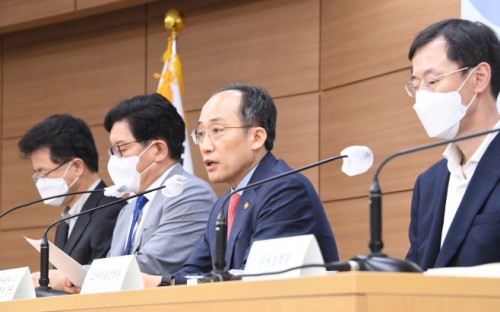 |
| Deputy Prime Minister and Minister of Economy and Finance Choo Kyung-ho, third from left, speaks in a briefing on ‘tax revision plan 2022’ held at the Government Complex Sejong on July 18, 2022./ Source: The Ministry of Economy and Finance |
AsiaToday reporter Lee Ji-hoon
The Yoon Suk-yeol government has decided to ease the tax burden on individuals by approximately 13 trillion won (US$9.9 billion) over the next four years in order to revitalize the economy and stabilize people’s livelihoods. The maximum rate of the corporate tax will be lowered to 22 percent, and the tax burden of salaried workers will be reduced by up to 800,000 won (US$609) per worker. The government plans to reform the comprehensive real estate holding tax scheme by lowering the tax rate and raising the tax base to 900 million won from 600 million won.
The government unveiled details of the ‘tax reform plan 2022’ at the Tax Development Deliberation Committee held on Thursday.
The plan is aimed to revitalize the corporate sector for economic growth and help stabilize lives of ordinary people. The government expects the plan will help strengthen corporate competitiveness and boost the vitality of the private sector through a 13 trillion won tax cut, the largest since the Lee Myung-bak administration.
To spur corporate investment, the government will lower the maximum rate of the corporate tax to 22 percent from the current 25 percent. It will also simplify the current four-tier tax base section used to impose the corporate tax into a three-tier one. To reduce the tax burden on small- and medium-sized enterprises with annual sales of less than 300 billion won, a 10 percent special tax rate will be applied to the tax base of 500 million won.
The stock trading tax, which is currently set at 0.23 percent, will be cut to 0.2 percent in 2023 and 0.15 percent in 2025. Taxation on financial investment income, such as stocks and virtual assets, will be deferred for two years until 2025.
To stabilize people’s livelihoods, the government will reduce the tax burden on middle- and low-income households by expanding the range of the two lowest income tax brackets.
But those earning more than 120-million won will see the amount they can deduct from their income tax reduced.
Salaried workers are to enjoy a yearly income tax cut up to 800,000 won per individual, the government said.
The comprehensive real estate holding tax system, which imposes greater tax rates for owning more houses, will now depend on the house price.
The basic tax rate itself will also be lowered to 0.5-2.7 percent from the current 0.6-3.0 percent.
For multiple homeowners, the threshold before having to pay the extra tax will be raised to 900 million won from the current 600 million won starting next year. For single homeowners, it will be raised to 1.2 billion won from the current 1.1 billion won.
“We have prepared the tax reform plan so that financial resources can be used for businesses and the low-income and middle-class struggling with inflation, without damaging the fundamental revenue base,” said Deputy Prime Minister and Minister of Economy and Finance Choo Kyung-ho.
#tax cut plan #Yoon Suk-yeol #income tax #comprehensive real estate
Copyright by Asiatoday
Most Read
-
1
-
2
-
3
-
4
-
5
-
6
-
7





















